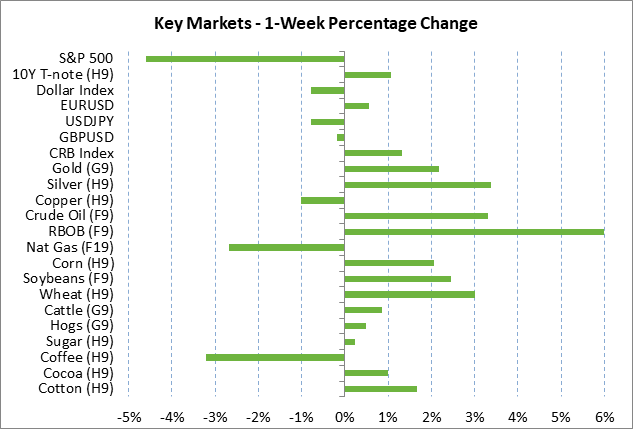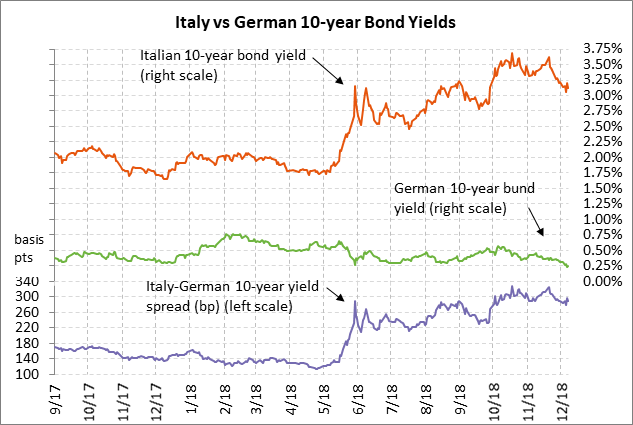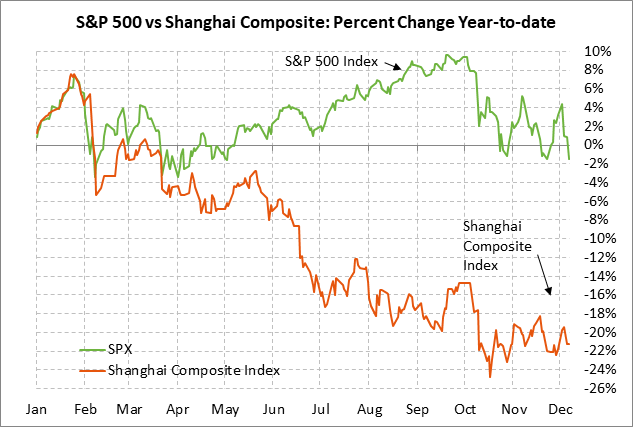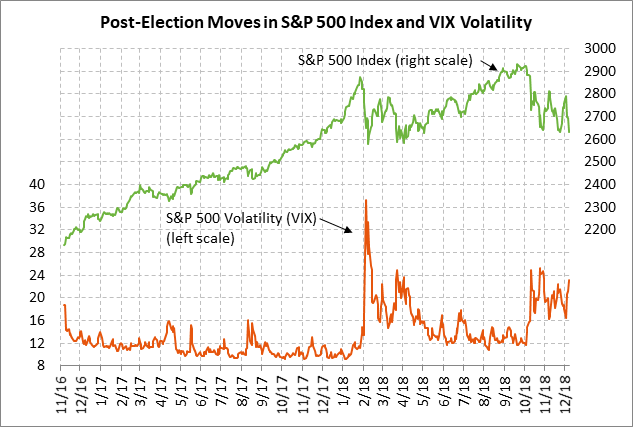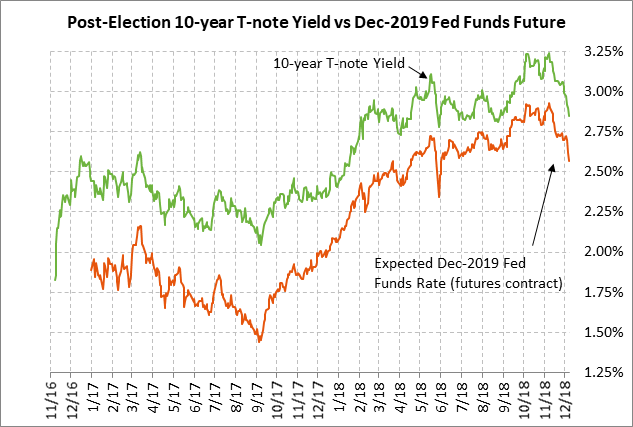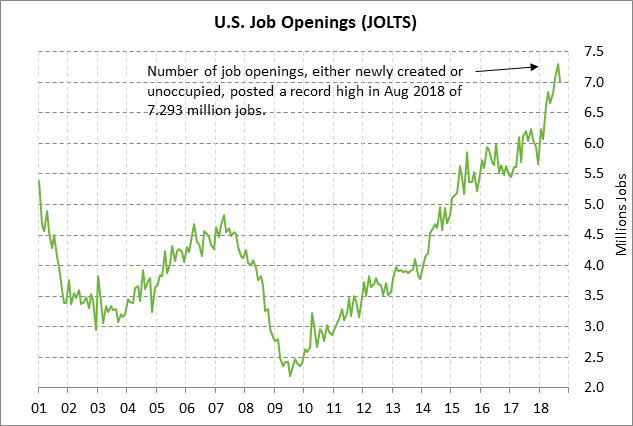- Weekly U.S. market focus
- European market focus
- Asian market focus
- Stock volatility likely to continue
- Job openings expected to recover a bit
Weekly U.S. market focus — The U.S. markets this week will focus on (1) US/Chinese tensions as the markets wait to see if the US/Canadian arrest of Huawei’s CFO will negatively affect the US/Chinese trade talks, (2) whether the U.S. stock market correction worsens with concerns about US/Chinese tensions and U.S. interest rates, (3) whether the FOMC at its meeting next week softens its tone after the expected rate hike, (4) the U.S. inflation outlook with this week’s PPI and CPI reports and with the 10-year breakeven inflation expectations rate last Friday falling to a new 1-year low of 1.90%, (5) the Treasury’s sale of $78 billion of 3-year and 10-year T-notes and 30-year bonds and whether there is a further flattening of the yield curve that sparks more worries about a recession, and (6) whether oil prices have hit bottom after OPEC+ last week agreed on a larger-than-expected 1.2 million bpd production cut for the first six months of 2019.
China over the weekend launched an all-out rhetorical campaign to try to get Canada and the U.S. to drop the arrest of high-profile CFO Meng Wanzhou of Huawei Technologies, China’s largest smartphone and communications equipment manufacturer. The Canadian court in Vancouver today is expected to resume consideration of whether Ms. Meng will be released on bail. The markets are waiting to see if China will retaliate for the arrest with some kind of action against U.S. companies operating in China or by curbing or ending the US/Chinese trade talks.
European market focus — This will be a busy week in Europe with the Brexit vote scheduled for Tuesday, the ECB meeting on Thursday, and the EU Summit on Thursday and Friday. French President Macron today is scheduled to meet with union leaders as he tries to tamp down the “yellow vest” protests against fuel tax increases and other issues.
German politics became smoother last week after Ms. Merkel’s hand-picked successor, CDU general secretary Annegret Kramp-Karrenbauer, won the vote as the new CDU leader. That should allow Ms. Merkel to ride out her term as Chancellor without a leadership challenge from within her party. The EU and Italy this week will continue their tussle over whether Italy will reduce its budget deficit from 2.4% of GDP to the EU’s preferred figure of 1.9%.
The ECB at its meeting on Thursday is expected to reaffirm its intention to end its QE program on December 31. The ECB is also likely to maintain a relatively dovish tone given the recent market turmoil and slower European and global economic growth. The market has deferred expectations for the ECB’s first rate hike until early 2020.
There were conflicting reports over the weekend about whether Prime Minister May will go ahead with Tuesday’s vote in Parliament on her Brexit separation plan. There is speculation that Ms. May might postpone the vote if there is going to be a landslide vote against the plan. A postponement of the vote would allow Ms. May more time to try to cobble together support.
However, if Ms. May proceeds with the vote and there is a landslide vote against her bill, then the fall-out could be significant both for the markets and for Ms. May’s government. There are a range of possible outcomes including an attempt to renegotiate the deal with the EU or political chaos involving a Conservative leadership challenge to Ms. May, a no confidence vote and new elections, and/or a second referendum. Ms. May is desperately trying to find some minor changes to the Brexit plan that the EU would accept and that could somehow allow the bill to squeeze by Parliament.
Asian market focus – The Asian markets this week will mostly focus on US/Chinese tensions and any fallout for Chinese stocks. In some positive news for China, Saturday’s Chinese inflation news was favorable and gave more flexibility to the Chinese central bank to ease credit conditions to address the slowing Chinese economy. China’s Nov CPI fell to +2.2% y/y from Oct’s +2.5% and the Nov PPI fell to +2.7% y/y from Oct’s +3.3%. Thursday night’s Chinese economic data is expected to be stable with Nov industrial production expected unchanged at +5.9% y/y and with Nov retail sales expected to rise to +8.8% y/y from Oct’s +8.6%.
Stock volatility likely to continue — Volatility in the U.S. stock market may continue this week due to uncertainty about how China will respond to the arrest of Huawei’s CFO and whether there will be a negative impact on the US/Chinese trade talks or an attack on U.S. tech companies. The arrest was a huge provocation for Chinese President Xi, who may fear looking weak if he doesn’t retaliate.
The stock market this week can at least be less worried about interest rates after the 10-year T-note yield last Friday fell to a 3-1/4 month low of 2.85%, down by -41 bp from Oct’s 7-1/2 year high of 3.26%. The market is now expecting only one Fed rate hike in 2019 versus expectations as recently as early November for two rate hikes. Even though the yield curve last week flattened due to lower long-term yields (as opposed to higher short-term yields), the stock market remains worried that the flatter yield curve might be signaling slower U.S. economic growth ahead. The 2s10s spread rose to 13 bp last Friday from Wed’s 11-1/2 year low of 12 bp.
Job openings expected to recover a bit — The market consensus is for today’s Oct JOLTS job openings report to show a +91,000 increase to 7.100 million, recovering part of September’s -284,000 plunge to 7.009 million. The series in general remains very strong and indicates that there are many job openings in the U.S. economy that need to be filled. However, hiring may be slowing a bit after last Friday’s weaker-than-expected Nov payroll report of +155,000 and the weaker 3-month average of +170,000 versus the 12-month average of +204,000.

